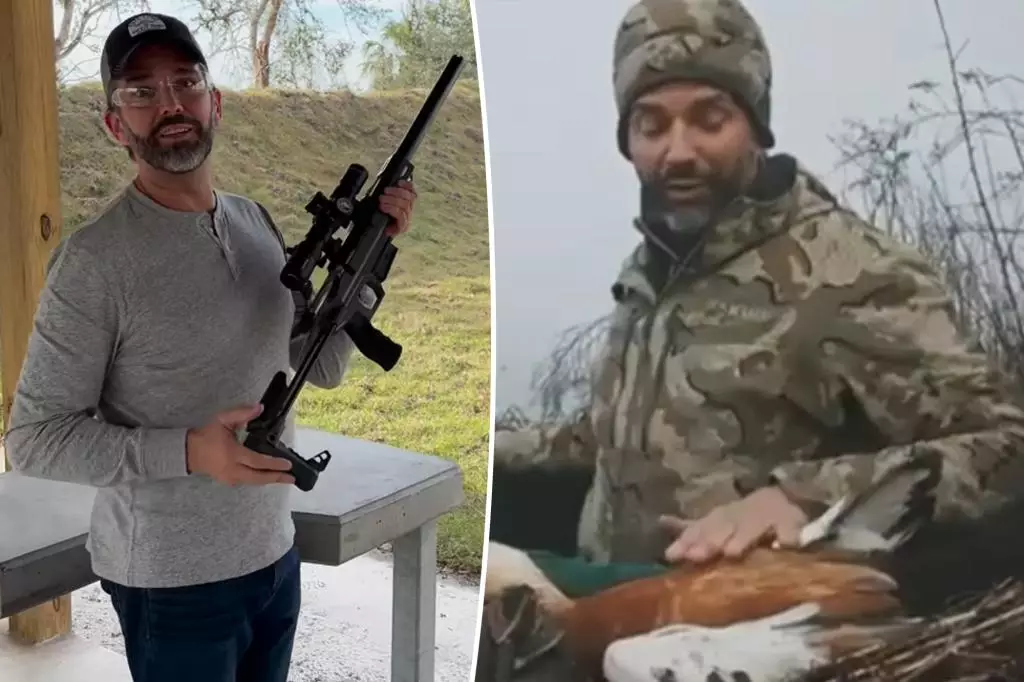The recent actions of Donald Trump Jr. during a duck hunting trip in Italy have sparked outrage among animal rights activists and local politicians. The incident, which involved the potential illegal hunting of a rare bird, raises significant questions about hunting regulations in foreign countries, the treatment of wildlife, and the implications of celebrity status in these contexts.
A video shared on Trump Jr.’s hunting website, Field Ethos, showcased him and a group of hunters participating in a duck shoot near Venice. The clip allegedly revealed a rare duck species among their catch, leading to an outcry from activists who view the shooting of such species as irresponsible and destructive. Italian animal rights advocates, along with local lawmakers, have expressed concern over the legality of Trump Jr.’s hunting expedition. The rising tensions have prompted calls for an inquiry, questioning whether the former president’s son followed appropriate hunting laws during his time abroad.
Critics assert that even if Trump Jr. possessed the necessary permits, it raises significant ethical issues regarding hunting practices, particularly in relation to rare or endangered species. Andrea Zanoni, a member of the Green Party, pointed out that non-residents are generally prohibited from hunting in Italy unless they meet stringent legal requirements. His comments denote frustration over perceived unequal treatment and the notion that celebrity status might afford impunity against legal repercussions.
In defending his actions, Trump Jr.’s spokesperson, Andy Surabian, asserted that the hunting group complied with all local laws and regulations. He claimed that they hunted in a legally sanctioned area, and the incident with the rare duck may have been a misunderstanding. Surabian emphasized Trump Jr.’s commitment to conservation efforts, stating that he would fully cooperate with any investigation into the incident.
However, while Surabian’s defense presents an image of a lawful and responsible hunter, skepticism remains concerning the ethics of hunting rare species, regardless of legality. It is crucial to reflect on whether adherence to legal standards alone suffices when considering the larger impact of hunting on wildlife preservation.
The controversy reflects broader societal issues surrounding hunting, especially when public figures are involved. Celebrity hunters such as Trump Jr. attract significant attention, which can amplify discussions on wildlife conservation and ethical hunting practices. This event serves as a reminder of the cultural divide regarding hunting; while it is seen by some as a traditional and acceptable practice, others view it as outdated and harmful to biodiversity.
Moreover, this incident isn’t Trump Jr.’s first encounter with wildlife-related disputes. A decade ago, he was criticized for participating in a legal but controversial hunting expedition where a rare species of sheep was killed in Mongolia. Such repeated incidents provoke questions about the messages celebrity hunters send regarding the treatment of wildlife and the consequences of their actions in the grand context of conservation.
The hunting incident has drawn ire from an array of political figures in Italy. Alongside Zanoni’s remarks, local politicians have urged the Italian government to take action. Many have called for strict penalties if Trump Jr. is found guilty of violating hunting laws, emphasizing that everyone—regardless of status—should be held accountable.
Such calls exemplify the critical standpoint that wildlife laws must apply universally to ensure the protection of rare species. In Italy, hunting regulations are steeped in tradition and designed to mitigate risks to endangered populations. Adherence to these laws is essential in a world increasingly aware of the delicate balance between human activity and ecological preservation.
In sum, the hunting escapade of Donald Trump Jr. in Italy serves as an important discussion point about wildlife conservation, ethics, and the potential for privilege to undermine accountability. The backlash he faces not only highlights cultural and ethical concerns related to hunting rare species but also reinforces the pressing need for all hunters—especially high-profile individuals—to champion responsible practices and advocate for wildlife preservation.
As investigations unfold, the ramifications of this incident could set a precedent for the treatment of wildlife and hunting laws, prompting a critical examination of how we value and protect our natural resources as a society.

Leave a Reply